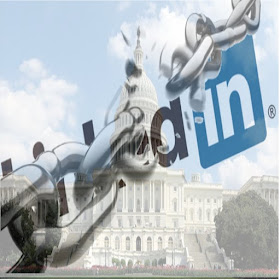SAN NARCISO, Calif. (Bennington Vale Evening Transcript) -- LinkedIn, the prominent social network aimed at working professionals, updated its user agreement Monday and added a provision banning subscribers from soliciting or offering services deemed prostitution. Under a section entitled "Don't undertake the following," LinkedIn admonished its members not to "upload, post, email, InMail, transmit or otherwise make available or initiate any content that: Even if it is legal where you are located, create profiles or provide content that promotes escort services or prostitution." In what company representatives called an unrelated coincidence, nearly all male members of Congress dropped their LinkedIn accounts, stating they no longer found value in the service. Agents from the U.S. Secret Service also reportedly canceled their subscriptions on Monday, citing similar reasons.
"The allure of a specialized network such as LinkedIn, which caters to a niche audience, is in fostering connections between individuals with needs and those who have something related to offer," said Otto Gressling, an analyst at a U.S.-based demographic research organization.
"It's a virtual rolodex where, the hope is, business people can easily seek out potential new colleagues and expand their network of contacts. But it's failing," he added.
According to Gressling, LinkedIn only performs for those people already well established and respected. The typical user's profile festers in anonymity.
"Given the respect level of most senators and representatives, I would imagine they receive very few friend requests or recommendations," he opined. "It makes sense they've abandoned LinkedIn."
But Janus Heuchler, head sociologist at San Narciso's Poeslaw Institute for Social Research and Development (PISRAD), doesn't believe the timing is accidental.
"The updated wording is too vague. LinkedIn must better define what it means by 'unlawful conduct' and 'prostitution,'" Heuchler argued.
He referenced Jack Abramoff to illustrate the prospective pitfalls of LinkedIn's vague statements about "unlawful" activities.
"Countless people of influence were damaged because of some nebulous rules and misunderstandings associated with Jack Abramoff's lobbying, including prominent representatives Bob Ney (R-Ohio) and Tom DeLay (R-Texas)," Heuchler noted. "But lobbying itself is legal. So there's a lot of ambiguity about what lobbyists can and can't do. It's like the FCC: it'll fine broadcasters for indecent content, but it can't tell them in advance what constitutes that indecency."
Heuchler believes LinkedIn's new "open to interpretation" policies alienate representatives and senators with veiled threats of penalties for networking with lobbyists, whom they need to raise campaign finances.
But the biggest bone of contention, Heuchler says, exists with the unspecified definition of prostitution: "Look at somebody like Speaker Boehner. This guy has sold his soul and his hide to every john with a buck. He's turned so many tricks, he makes David Copperfield look amateurish. And he's indiscriminate; he'll service any customer. Politically speaking, that makes him an unapologetic trollop."
Boehner's sponsors are indeed sundry. ATT and Murray Energy bankroll his campaigns. But so does student loan lender Sallie Mae. Heuchler finds this ironic because Boehner, like most conservatives, consistently votes against furthering education in the country.
Boehner is also heavily subsidized by Big Tobacco. In 1995, he famously handed out campaign contributions to other politicians on the House floor from tobacco lobbyists. Yet, Boehner also accepts sizable donations from healthcare industry leaders such as Blue Cross/Blue Shield.
"There's no rhyme or reason to it, no method to the madness -- he just sells himself to the highest bidder," Heuchler said. "Like a whore."
LinkedIn's shares are likely to plummet as prominent public servants scramble to sign up for other social networks, but Heuchler sees a silver lining for campaign finance reform advocates who were crushed by the 2010 Citizens United victory.
But with the majority of those candidates severing themselves from LinkedIn, a critical business communications vehicle, powerful corporations hoping to avoid paying taxes could have a much harder time locating willing congressional partners in the future.
In related news, GE, Verizon, Wells Fargo, Duke Energy, DuPont, Boeing, Corning, FedEx and others have petitioned LinkedIn to relax its latest prohibitions.
2013. Licensed under a Creative Commons Attribution-NonCommercial 3.0 Unported License. See disclaimers.
